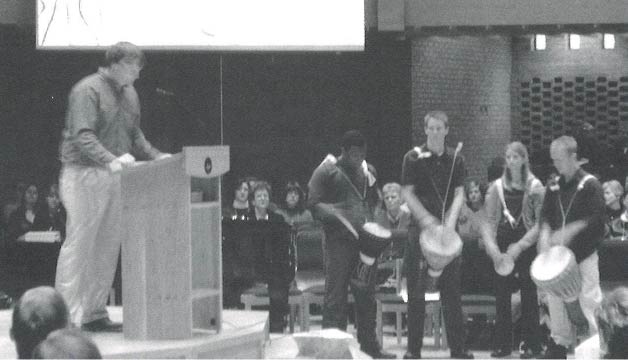During January 2004, worship at Calvin College, Grand Rapids, Michigan, focused on the message of Isaiah 60 (see also p. 22), in light of provocative discussion of this text in Richard Mouw’s When the Kings Come Marching In: Isaiah and the New Jerusalem, (rev. ed. Eerdmans, 2002). The following service was prepared by a Symposium planning team for morning worship in the Calvin College Chapel during the Calvin Symposium on Worship and the Arts.
Opening
[For personal preparation and meditation, Marc Chagall’s The Prophecy of Isaiah was projected on the screen as people arrived. That painting also inspired the artwork for the rest of the service that accompanied the Scripture and song texts.]
Gathering Music: “Arise, Shine, for Your Light has Come” Grotenhuis and Glass
[For a prelude, the pianist improvised on “Arise, Shine” until most had gathered; then the soloist began singing the (projected) stanzas; all joined on the refrains and on the final stanza.]
Call to Worship: Psalm 47:6-9 (text was projected and read responsively)
Psalm of Praise: Psalm 47: “Clap Your Hands” SNC 156 (sung from book; with piano and hand percussion)
Greeting: Isaiah 42:6-8; 2 Peter 1:2 (concluded with congregational Amen!)
Hymn of Praise: “Jesus Shall Reign” Watts (with organ; text projected)
Confession and Assurance
Call to Confession: 1 John 2:7-11
Prayer of Confession (with sung refrain following the words “Lord, have mercy”)
Refrain: “Kyrie Eleison” SNC 50 (music was projected; accompanied by a bass drone and quiet drumming that continued throughout the prayer)
Prayer
Almighty and merciful God,
we confess that we have sinned against you and
one another
in both our actions and inactions.
Lord, we walk in the darkness;
Lord, have mercy.
Refrain
We confess our fear that we have shrunk from
your glory
and shown our smallness of vision.
We recognize that in Christ Jesus our light has come,
yet so often we choose to walk in shadows and
ignore that light.
Lord, have mercy.
Refrain
We confess our pride and smallness of vision.
We have put faith in our own tribes in place of
your bride.
We confess we have failed to reflect your light.
But we sulk in the darkness of selfish circles,
protecting our interests, insisting on our own way,
building our own kingdoms.
Lord, have mercy.
Refrain
Gracious God, forgive our sins,
and remove from us the veil of darkness that
shrouds our lives.
Lord, have mercy.
Refrain
[silence]
Forgiven in Christ and illumined by your Spirit,
may we rise to the radiance of Christ’s glory.
Amen.
Assurance of Pardon: 1 John 1:5-7
Response
“Come and Let Us Worship God” SNC 6 (with piano)
“Lord, To Whom Shall We Go?” SNC 87 (unaccompanied)
[After the robust energy of the first song, a short silence prepared for the next song, which was sung by rote, first by a soloist, then repeated by all two times.]

Proclamation
Prayer for Illumination
Blessed are you, Holy God.
In Jesus Christ your light shines in the darkness
and the darkness cannot overcome it.
Blessed are you, God of Light.
Shine in our lives, with the light of Christ,
that we might give you praise through him,
who lives and reigns with you and the Holy Spirit,
now and forever. Amen.
—Worship Sourcebook, F.3.1.5
Old Testament Reading: Isaiah 60:1-11, 19-22
The Word of the Lord.
Thanks be to God.
New Testament Reading: Revelation 21:22-22:5
The Word of the Lord.
Thanks be to God.
Sermon: “Arise, Shine, Your Light Has Come”
[Followed by a moment of silent meditation.]
Dedication
Hymn of Response: “I Want to Walk as a Child of the Light” SNC 77 (with organ)
Intercessory Prayer
Gracious God, light of all creation, we praise you.
For the multitudes around the world who are
today using the resources of their cultures
and customs to worship the Christ and build
your kingdom;
for the church and its ministry to the world;
for all those who bring the gospel of Jesus to the
nations;
for those who have not heard the good news of
salvation;
for those who have heard but have not believed;
for those who have forsaken their faith,
let us pray to the Lord.
Lord, hear our prayer.
For the nations of the world and their needs;
for all those in authority;
for those who suffer war and oppression;
for those who are sick in mind, body, or spirit;
for those who are hungry or homeless;
for those who are dying or bereaved;
let us pray to the Lord.
Lord, hear our prayer.
For the saints who have gone before us in faith,
we give thanks to the Lord.
For the saints on the earth who surround us in
a great fellowship of love.
let us pray to the Lord.
Loving God, hear these prayers of your faithful
people.
Guide our thoughts and actions.
Let us walk by the lamp of the Lamb so that your
will may be done, and your name be glorified.
By the Spirit and in the name of Jesus Christ we pray.
—adapted from Worship Sourcebook, F.F.4.4.8; F.4.4.6
Sung Prayer: “The Lord’s Prayer” SNC 196
[First time through, congregation was invited to pray by listening (to a soloist) and watching (the gestures by a dancer, gestures that were also projected on screen). Second time through, congregation was invited to pray either by singing and/or by offering the gestures. Since this was the final singing of the service, the organist built up the volume to reach a powerful climax on the words “and the glory forever, Amen.”]
Benediction
Brothers and sisters,
God go before you to lead you.
God go behind you to protect you.
God go beneath you to support you.
God go beside you to befriend you.
Do not be afraid.
And may the blessing of God the Father, Son, and Holy Spirit be upon you.
Do not be afraid.
Amen.
Let us greet each other in the name of the Lord.
